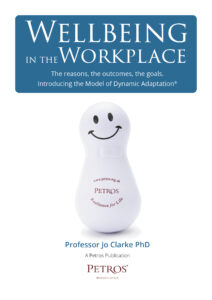The Specific and Unique Nature of Your Business

As adults we spend approximately a third of our time (or more) at work, so it’s not surprising that work plays a significant role in how psychologically well (or not) we feel.
Understanding how to enhance the positive while reducing the negative is not simply laudable, it’s necessary.
Even looking at the most conservative statistics about impact, the financial cost of mental ill-health is substantial.
Empowering people to thrive at work is challenging, not least because of how complex and diverse we all are. But also, because of the dynamics that result from a wide range of different mental ill-health outcomes when we fail to thrive. Petros offers a range of solutions, interventions, and strategies to enhance the psychological wellbeing of your employees and prevent work-related mental ill-health.
Introducing the Model of Dynamic Adaption®(MDA)
To help makes sense of the myriad of factors that can impact on our mind health, or mental health, we base our solutions on The Model of Dynamic Adaption®. It arose out of research into why some people thrive and others don’t and encapsulates the fact that our mental health is in constant motion. If organisations can respond flexibly to the dynamics of employee well-being, there is a much higher chance of maintaining good mental health for most of us, most of the time.
It is important to recognise that different occupations present different challenges and risks. It’s often quoted that 1 in 4 have a mental health challenge however this may be much smaller in high-risk jobs with a toxic culture compared with an organisation that explicitly sets out to look after its staff.
Statistics around the economic costs of mental ill-health should also be treated with considerable caution, given that, by definition, they can only reflect the economic climate at the time the research was undertaken.
Everyone has mental health
With these cautions in mind, it is best to simply acknowledge that, just like physical health, everyone has mental health. Sometimes it’s good and sometimes not so good. Just like staying physically healthy, there is plenty that can be done to ensure we stay mentally healthy. When we’re not, it can be costly – emotionally, socially and economically.
The specific and unique nature of your business
What is important is that organisations think hard about the specific and unique nature of their business and create an approach to mental health that addresses the needs of the majority of their staff most of the time, and aspirationally, all of the staff, all of the time!
Critical occupations place a greater demand on the psychological wellbeing of staff than others, usually because of the content of the work. The emergency services are obvious examples, where staff deal with and witness trauma on an almost daily basis. Teaching, social work, criminal justice, health, and any other caring profession is also likely to put staff at a higher risk of exposure to potential psychological harm than many other occupations.
Then there are occupations that perhaps put more cognitive, rather than emotional, demands on staff. Roles that require hyper-vigilance, such as air traffic control, nuclear power, electrical work, driving and so on, make a large demand on people’s attention and therefore different interventions may be required.
There is unlikely to be a “one size fits all” approach to supporting the mind health of everyone in work. It will take time and attention to consider what will work best for your business.
The nature of your business and its impact on the wellbeing of your staff
Our free eBook, Wellbeing in the Workplace, explains how your organisation can ensure your people aren’t just surviving but thriving. It also explains The Model of Dynamic Adaption® which suggests WHERE and, importantly, HOW to intervene, thus promoting the best possible mind health for your staff.
Download our free eBook today and start to address the very real business case of mind health at work.
Learn more about Petros Founder and Managing Director, Professor Jo Clarke PhD and her highly experienced team.






